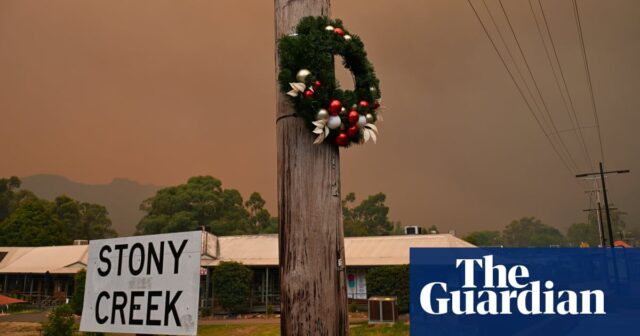A scorching blast of hot weather will intensify across Australia’s south-east bringing extreme fire dangers and total fire bans from Christmas onwards.
South Australians will swelter on Christmas Day with Adelaide set to record its hottest Christmas since 2016, as temperatures reach the high-30s to early 40s across the state.
Parts of the state face extreme fire dangers with total fire bans declared in the Mount Lofty Ranges and the west coast region on Wednesday, while Victoria continues to battle out-of-control fires in the Grampians.
Senior meteorologist at the Bureau of Meteorology, Dean Narramore, said hot, dry and windy conditions would drive extreme fire dangers through parts of South Australia and Victoria on Wednesday and Thursday, while high fire dangers would be in place through much of the country.
He said southern parts of South Australia and western and central Victoria, including metropolitan Melbourne, were of most concern.
“[Conditions] are ripe for fires to become uncontrollable and uncontainable, particularly with fires already ongoing around the Grampians and central parts of Victoria,” he said.
Narramore said on Christmas Day, the heat would build across central and south eastern parts of the country, with temperatures reaching the high 30s and low 40s.
“Boxing Day will be even hotter, with temperatures in the high 40s through parts of Queensland extending all the way down into western New South Wales and northern parts of Victoria,” he said.
Victoria faces its worst fire risk since 2019’s black summer, with extreme fire dangers in all but one region, leading to a total fire ban for the state on Boxing Day.
Melbourne was expected to reach the high 30s and low 40s in some suburbs on Christmas Day, rising into the 40s on Thursday before a cold front arrived at around 8pm.
Meanwhile, South Australia is in one of the driest periods on record, the Country Fire Service chief officer, Brett Loughlin, said, warning fires can spread rapidly.
“All we need is heat and wind to combine to create conditions for total fire bans and high-risk fire weather,” Loughlin said.
The state’s premier, Peter Malinauskas, has urged people to enjoy the festive season but to act sensibly and cautiously if they are in bushfire zones.
High temperatures bring increased risk of serious heat-related illnesses, including heat cramps, heat exhaustion and heat stroke, Ambulance Victoria emergency management director Dale Armstrong warned.
Heat stroke is fatal in up to 80% of cases.
“Most at risk are elderly people, young children and those with medical conditions, however heat and heat-related illnesses can affect anybody,” Dale said.
Victorians were being urged to prepare for outages, with provider AusNet warning power faults could be triggered to prevent bushfires starting.
“If a fault occurs on Thursday, it may mean longer outages as we need to do additional checks and patrols to make sure it’s safe to turn the power back on,” a spokeswoman said.
On Wednesday bushfires were continuing to burn out of control at the Grampians national park in Victoria’s west while another has been contained at Bullengarook in Melbourne’s north-west.
The Grampians bushfires were travelling in a northerly direction, however elevated winds were pushing smoke towards the south.
A TOTAL FIRE BAN has been declared for the whole State of Victoria on Thursday 26 December 2024. 🚫 🔥
No fires can be lit or be allowed to remain alight in the open air from 12:01 AM until 11:59 PM Thursday 26 December 2024. Visit https://t.co/lFdBeHgAwP pic.twitter.com/U1252slfTf
— cfa_updates (@CFA_Updates) December 24, 2024
The Country Fire Authority’s chief officer, Jason Heffernan, warned strong winds could make fighting blazes challenging.
“We did not see those winter rains. We didn’t see those spring rains, which has led to the bush land areas being exceptionally dry,” he said.
Narramore said a cool change would sweep through on Thursday night, focusing fire conditions into northern and eastern parts of New South Wales.
Queensland was expected to be fine and mostly sunny across the south and west on Christmas Day, with a top of 30, while NSW was also expected to be warm and clear, with daytime temperatures up to 4C above average.
Sydney was expected to reach a top of 27C, with hazardous surf conditions extending to the Hunter and Macquarie coasts.
Canberra was expected to reach a top of 31C, as was Melbourne, while Tasmania was forecast to reach a top of 23C and Adelaide 37C.
Western Australia was expected to be hot in the north and cooler through the central and southern parts of the state, with isolated showers, while the Northern Territory was forecast to have humid weather with some showers and storms.






